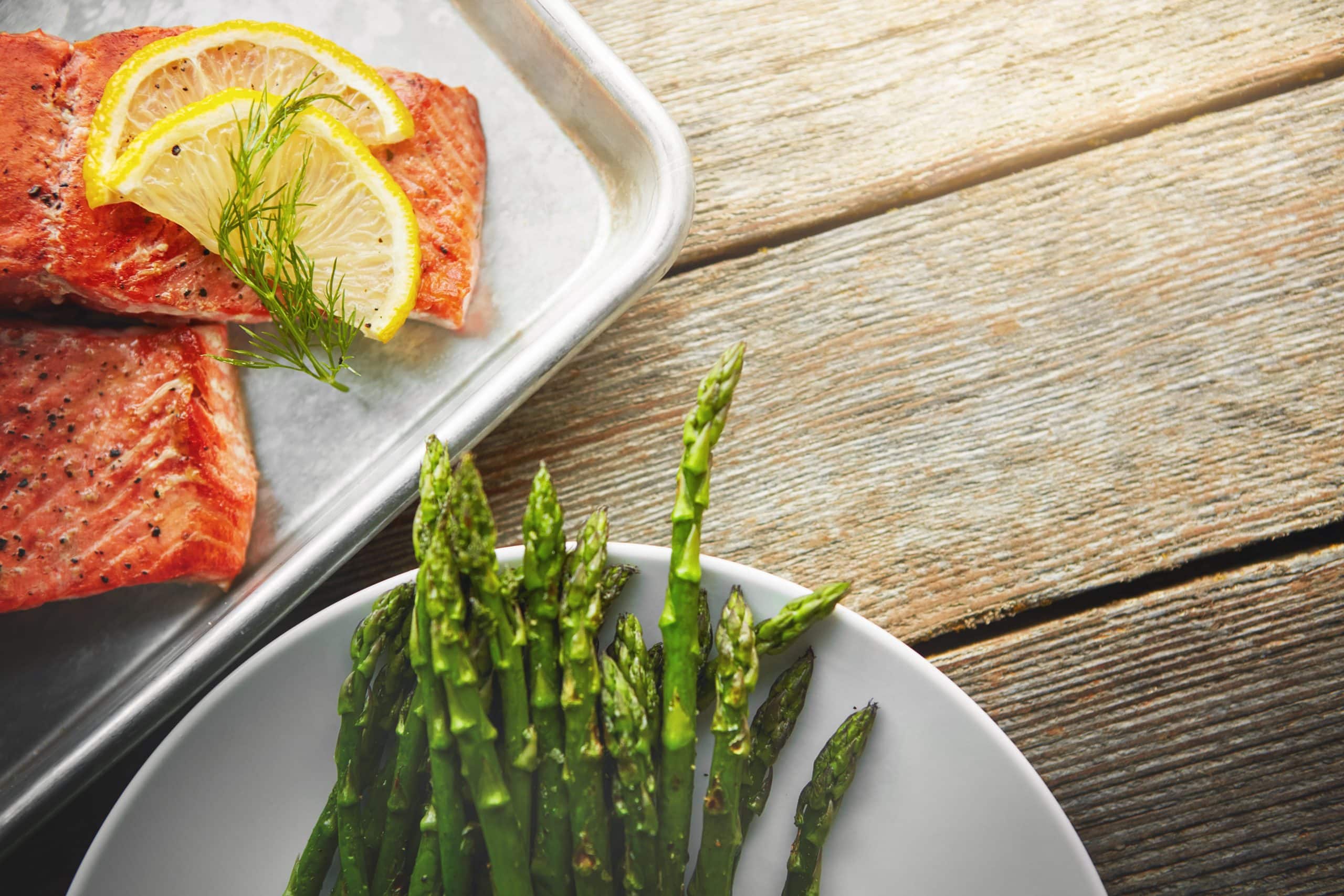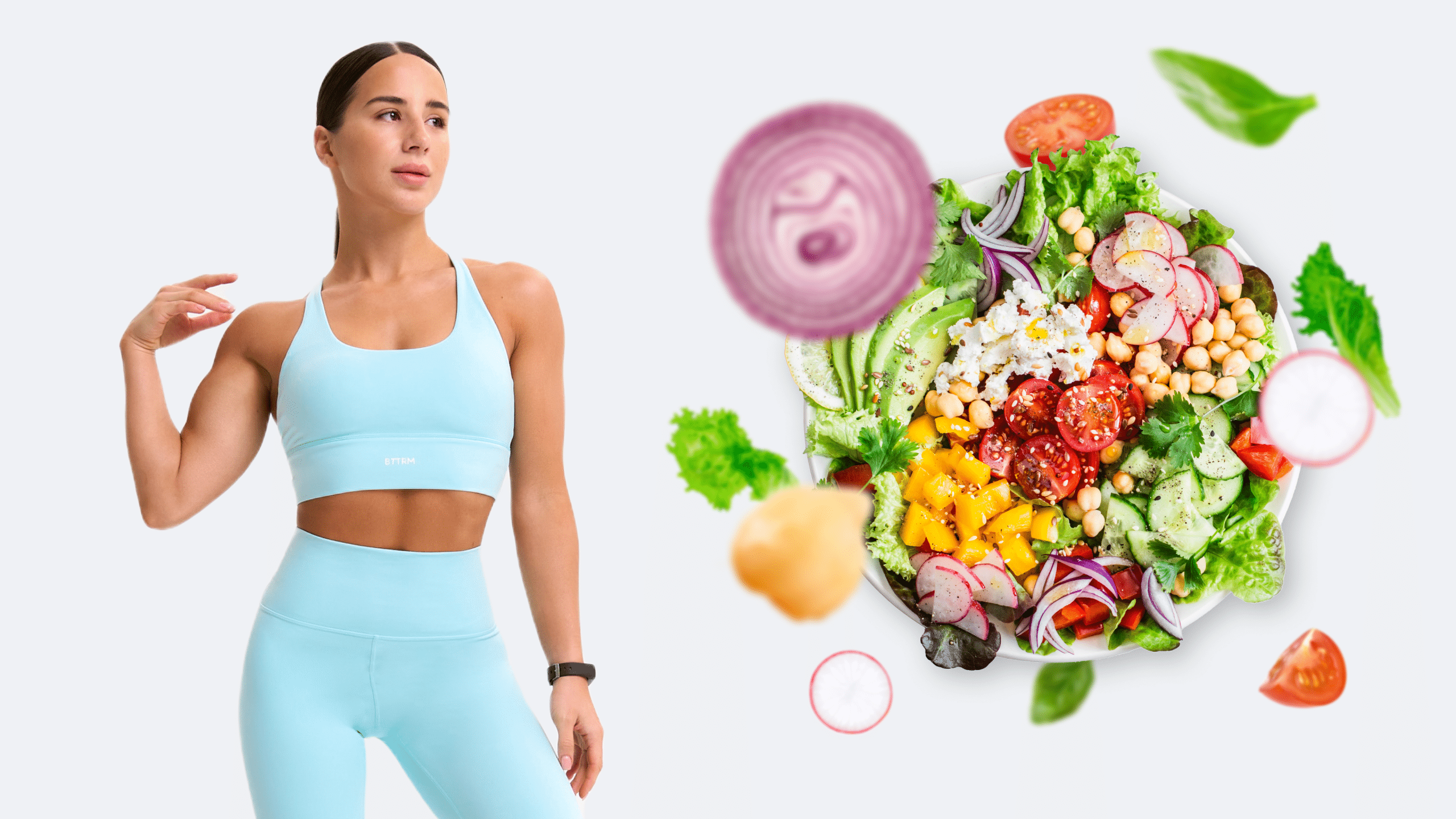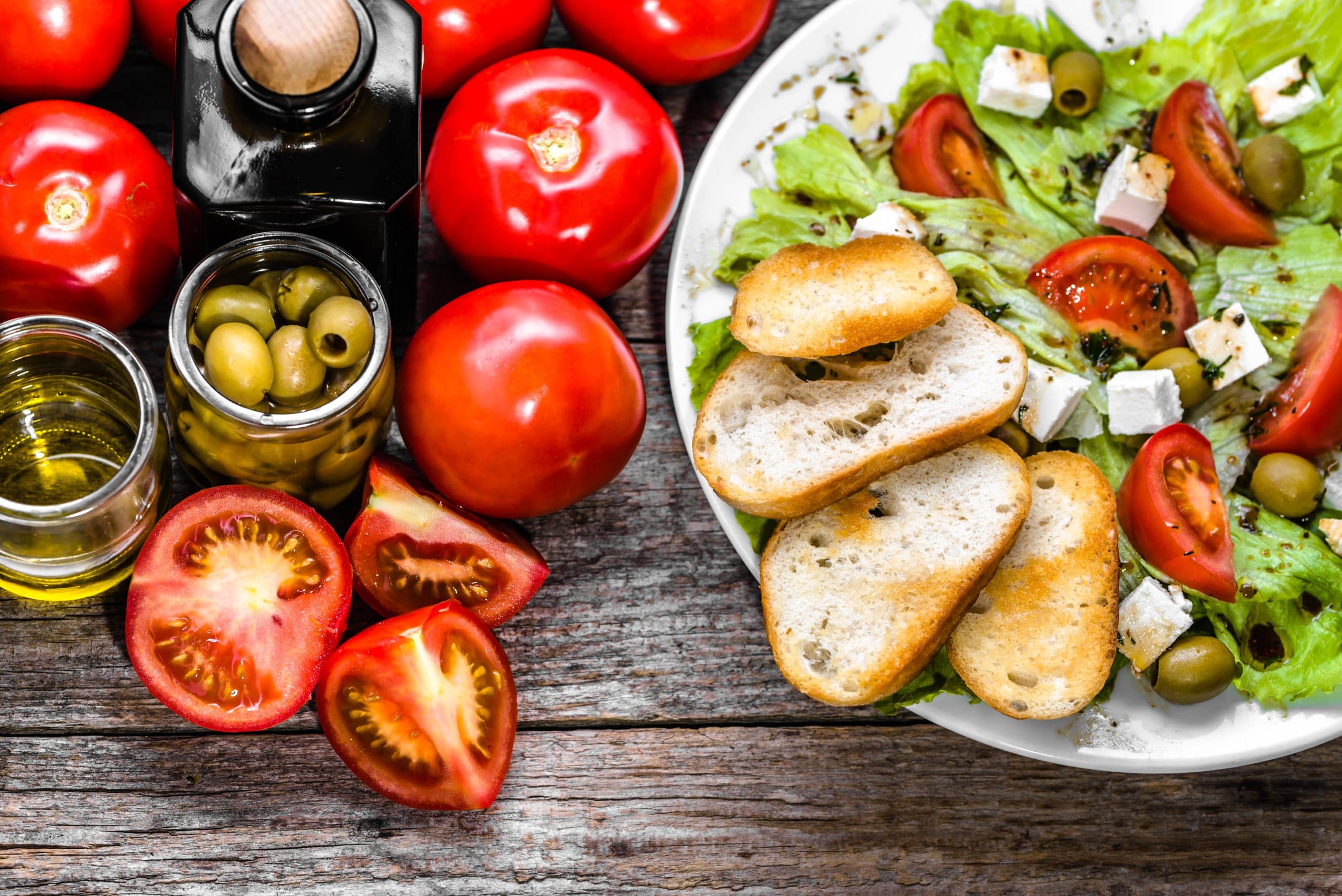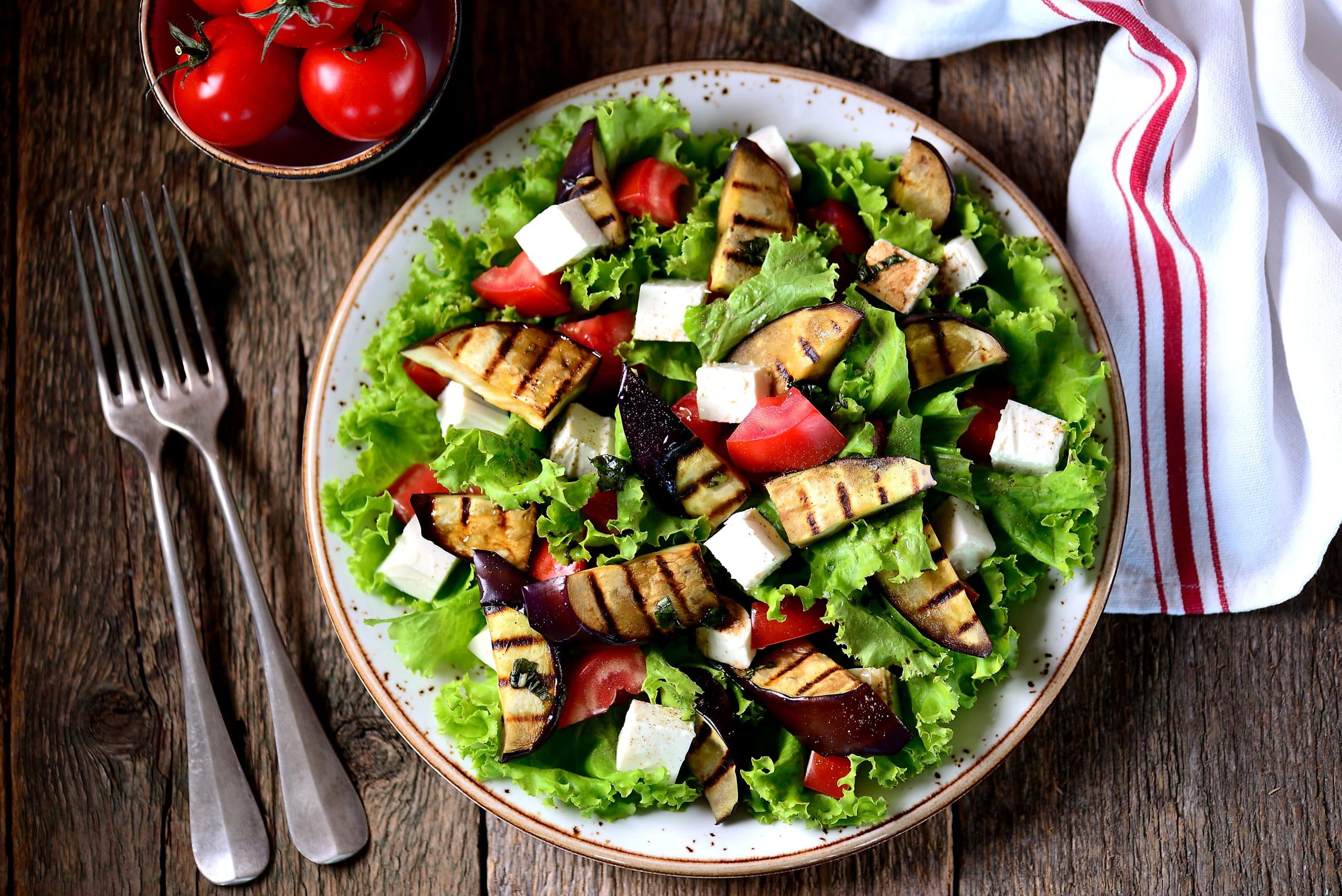In the world of health, fitness, and nutrition, it’s quite common to see diets gain popularity very quickly and fall off just as fast. However, hidden within these trends are diets that have stood the test of time and while they may not be as trendy, they are healthy and effective. The Mediterranean diet is one such eating plan.
One study comparing different eating plans described this plan as a food-based, nutrient-adequate, and focused diet that is good for maintaining long-term weight reduction (1). Another study reviewing trials done on the diet suggested that it has beneficial effects that may be primarily related to its anti-inflammatory and antioxidant properties, in addition to the effectiveness of this dietary pattern in controlling waist circumference and obesity (2).
Clearly, the Mediterranean diet meal plan is a great option for those who are looking to better their health and/or manage their weight. But how do you deal with meal prepping for it? Read on to learn more about how you can get started on the Mediterranean diet meal prep, the approved food list, how to make it vegetarian, and more.
What Is the Easiest Mediterranean Diet Meal Plan?
The easiest Mediterranean diet plan is simply one that works for you. As with all other popular diets, the eating plan emphasizes certain types of foods over others, but it is highly flexible and adaptable.
When it comes to meal planning, however, you should pick the foods that are easily accessible and affordable to you and that you enjoy.
This helps ensure that you’ll eat all the meals, thereby avoiding food waste, and you also get to save some money and remove the hassle of trying to find foods that may not be easy to find in your region.
What Exactly Do You Eat on A Mediterranean Diet Plan?
As stated above, this eating plan has some guidelines that direct you as to what you should eat more of, what you should limit, and what you should avoid. But what exactly is on the approved Mediterranean diet food list?
The first step in doing your Mediterranean diet meal prep is understanding what this diet includes, and the rules are very simple. This eating plan involves a high intake of fruits and vegetables, whole grains, legumes, nuts, and seeds. Low-fat dairy is consumed regularly, while fish, poultry, and eggs can be enjoyed in moderation. Red meat is very limited. (1).
Research also states that when it comes to eating behaviors in Mediterranean countries, the common features include (2)
- A daily consumption of non-refined cereals and other products, in addition to fresh fruits, vegetables, nuts, and low-fat dairy products
- A reliance on olive oil as the principal source of lipids (aka healthy fats)
- A moderate consumption of fish, poultry, potatoes, eggs, and sweets
- A moderate intake of alcohol, preferably red wine, and usually with meals (optional)
- Limited consumption of red meat – usually once a month or so
- The inclusion of regular physical activity in your day-to-day life
BetterMe: Health Coaching app is a foolproof way to go from zero to a weight loss hero in a safe and sustainable way! What are you waiting for? Start transforming your body now!
The following table further breaks down the types of foods that you should be using in your Mediterranean diet recipes:
| Vegetables | Fruits | Legumes and Grains |
|---|---|---|
| Cabbage Bell Peppers Carrots Kale Cucumbers Squash Cauliflower Tomatoes Onions Sweet Potatoes Broccoli Zucchini Lettuce Spinach and Swiss chard | Apples Olives Oranges Peaches Pears Pomegranate Grapes Watermelon Figs Dates Tangerines Avocados Strawberries Cherries | Oats/oatmeal Chickpeas Brown/green/red lentils Brown/wild rice Bulgur Buckwheat Kidney beans Quinoa Farro Couscous Black beans Soybeans Whole-wheat bread and pasta |
| Herbs and Spices | Sauces/Seasonings/ Flavourings | Nuts and Seeds |
| Garlic Rosemary Oregano Dill Cilantro/coriander Mint Basil Paprika Cumin Cinnamon Cloves Turmeric Chili peppers, etc. | Vinegar (apple cider, balsamic, etc.) Red wine (for drinking and cooking) Tahini Tzatziki Hummus Salt Olive oil | Almonds Chia seeds Walnuts Sesame seeds Pine nuts Hemp seeds Pistachios Sunflower seeds |
| Fish/Seafood/Poultry (to be consumed in moderation) | Dairy (to be consumed in moderation) | Red Meat (limited consumption) |
| Chicken Salmon Duck Shrimp Tuna Turkey Sardines Halibut Eggs (chicken, quail, duck, etc.) | Greek yogurt Kefir Cheeses such as feta, brie, cotija, Swiss, halloumi, ricotta, manchego, and parmesan | Lean beef, pork, and veal Game meats are also allowed |
To make your shopping experience much better for yourself:
- Use this table to make a list of what you have and don’t have in your fridge/pantry. This will prevent overspending.
- Make a menu before you head to the store. Having an idea of what you want to eat for the week will help make the shopping trip more seamless.
- Shop seasonally. Produce is always much cheaper when it’s in season.
- If you can’t find a particular food item, search for a healthy alternative.
- Remember that this diet is about broadly emphasizing certain food types – the specific foods and flavors are up to you.
To learn how to use all these foods in your meal prep, check out the Mediterranean diet 30-day meal plan for some fun meal ideas.
What Is Not Allowed on the Mediterranean Diet?
Here are the foods you should be aware of and not include on your grocery list or in recipes when making your Mediterranean diet meal prep for beginners:
- Added sugars – This means table/cane sugar, in addition to foods and drinks that are high in sugars such as sodas, baked goods, ice cream, syrups, etc.
- Refined grains – While whole grains are encouraged, refined/processed grains are not. Options such as white rice, white bread and pasta, etc. shouldn’t be a major part of your eating plan.
- Unhealthy fats – These are largely found in ultra-processed and fried foods, so do not buy or eat them. Make sure to also avoid or really limit the consumption of butter and fatty meats.
- Processed meats such as sausages, hot dogs, deli meats, and beef jerky.
- Highly processed foods – Fast food, convenience/box meals, etc.
As you can see, the Mediterranean diet is not nearly as strict as other popular diets. It doesn’t limit any of the major food groups, nor does it cut out any natural foods from its approved food list. This makes it one of the easiest diets to follow.
Read more: 7 Day Mediterranean Diet for Weight Loss: What to Eat and How to Follow
How to Make a Mediterranean Diet Meal Week Plan
Here are some tips to help you meal prep for this eating plan:
Start with What You Know
The best thing about the Mediterranean diet food list is that it’s extensive and that most of the emphasized foods on the list are things you’re already familiar with.
When making your meal prep menu, choose the foods that you’re most comfortable with in terms of prep and taste. You can also plan meals around what’s in season or on sale at the supermarket.
Decide How Many Days of the Week You’d Like to Meal Prep
This will help avoid food waste if there are leftovers and can save you money. While fresh foods are great, they go bad quickly if they’re not stored properly. Deciding how many days to meal prep for will help you buy just the right amount of groceries so you don’t waste any. If you have plans to eat out, account for these too so you don’t cook too much.
Batch Cook – Especially Your Grains
This helps save time. If you realize that your menu for the week calls for rice, quinoa, couscous, etc., several times a week, make a large batch of it and store it in your fridge. Cooked grains can also be frozen. Vegetables can also be made ahead of time, but if you don’t like to do that, at least wash and cut them up ahead and store them prepped so you don’t spend a lot of time in the kitchen the next time you want a meal with that particular vegetable.
Buy Seasonally
Not only does buying whatever produce that’s in season save you money, you also may get the most nutrients from said food. Fresh produce is always the most nutritionally dense when it’s in season. Please note that this doesn’t apply to frozen produce as this is frozen at its peak, thereby preserving most nutrients.
Find Shortcuts
One of the downsides of meal prepping that puts people off the idea is the fact that it takes time. Meal prepping for a full week can take anywhere between 2 and 4 hours of your day. To free up some time, shortcuts such as buying pre-prepped foods, making slow-cooked meals in a slow cooker, or even making one-pot meals will help you save time on both the prep and cooking parts of this process.
If You Get Bored Easily, Have Some Variety
It’s no secret that while some people have no qualms about eating the same things for dinner or lunch 5 to 7 days a week, others can’t stand to eat the same meal two days in a row. If you’re in the latter group, you can opt to meal prep smaller different meals or freezer meals to avoid the above problem. You can also choose to ingredient prep rather than meal prep – with ingredient prep, you simply get the ingredients ready and store them in the fridge. In this way, you can mix and match these ingredients to make something new whenever you want to eat something.
Make Your Sauces
Sauces are an integral part of Mediterranean cooking, and many of them can be easily made at home. While you can buy sauces from the grocery store, the ingredient list may have some additives you don’t want. To avoid this, learn how to make and properly store your sauces at home.
Whether you’re a workout beast or just a beginner making your first foray into the world of fitness and dieting – BetterMe has a lot to offer to both newbies and experts! Install the app and experience the versatility first-hand!
How to Make Your Mediterranean Diet Meal Prep Vegetarian
The majority of the foods on this diet come from plant-based sauces, which already makes it vegetarian-friendly. However, the consumption of animal meats, poultry, and seafood – no matter how limited – obviously makes it not so vegetarian-friendly.
So how do you fix this? Simply by removing whichever foods that don’t match your version of vegetarianism (3, 4):
- Vegans don’t consume any animal products, so their version of this meal plan won’t include any red meat, poultry, eggs, dairy, or any kind of fish or seafood.
- Flexitarians consume meat sporadically, so a meal that includes meat occasionally is OK in their diet.
- Pescatarians or pesco-vegetarians avoid all kinds of meat but still eat fish and seafood, in addition to eggs, milk, and milk products.
- Lacto-ovo vegetarians won’t eat any kind of meat, fish, or poultry but are okay with consuming eggs and dairy products.
Just replace the animal proteins you remove with more plant-based protein sources such as legumes and soy products.
How to Come up with Recipes for a Mediterranean Diet Meal Plan
You don’t need to rack your brain to come up with recipes for a Mediterranean diet meal prep plan. There are many sources online that have numerous recipes you can draw inspiration from. Our only advice for you when looking up these recipes is:
- Always look at the calorie measurement per serving of each recipe. Some recipes, while utterly delicious, have more calories than you may want if you’re trying to lose weight. Remember that while this eating plan doesn’t call for calorie counting, if you want to lose weight, counting your calories can be helpful, at least at the beginning of your journey.
- Use a calorie-counter to track your daily food intake if you choose to do so. As stated, this is really helpful for weight loss. You can also use the calorie-counting app to ensure you’re not under-eating, and if you simply want to maintain your weight but eat healthier through this diet, calorie-tracking can help with this too.
What Is the Fastest Way to Lose Weight on the Mediterranean Diet?
The simplest way is by following the dietary guidelines set up by the eating plan. A lot of the limited or avoided foods are rich in unhealthy fats and added sugars that are best limited for your health and weight control/management. The foods that are emphasized are generally lower in calories but rich in nutrients.
You can also add physical activity. Aim for 150 minutes per week of moderate-intensity aerobic activity, along with strength training twice per week.
Read more: Healthy Mediterranean Recipes: The Foods You Can Try on Your Diet
FAQs
Do you lose belly fat on a Mediterranean diet?
Yes, you can. Studies that have been done on this eating plan show that it can be successful for helping with the management of weight gain, obesity, and abdominal obesity (5, 6, 7).
Is Greek food Mediterranean?
Yes, it is. People from countries credited with the establishment of the current Mediterranean diet include Iberians, Celts, Greeks, Romans, and Arabs (8).
Why is chicken not on the Mediterranean diet?
Chicken and other poultry are included in this eating plan. However, you’re advised to consume them moderately – once or twice a week and not daily.
Is rice OK on the Mediterranean diet?
Yes, rice is allowed on this eating plan. However, you’re advised to opt for brown or wild rice instead of white rice as whole grains are emphasized.
The Bottom Line
If you’ve been thinking about doing Mediterranean diet meal prep, we hope the above tips give you a good idea about what to do and where to start. Remember that no one does everything perfectly the first time, so play around with the recommended food list to find what you like best. Be patient and good luck!
DISCLAIMER:
This article is intended for general informational purposes only and does not serve to address individual circumstances. It is not a substitute for professional advice or help and should not be relied on for making any kind of decision-making. Any action taken as a direct or indirect result of the information in this article is entirely at your own risk and is your sole responsibility.
BetterMe, its content staff, and its medical advisors accept no responsibility for inaccuracies, errors, misstatements, inconsistencies, or omissions and specifically disclaim any liability, loss or risk, personal, professional or otherwise, which may be incurred as a consequence, directly or indirectly, of the use and/or application of any content.
You should always seek the advice of your physician or other qualified health provider with any questions you may have regarding a medical condition or your specific situation. Never disregard professional medical advice or delay seeking it because of BetterMe content. If you suspect or think you may have a medical emergency, call your doctor.
SOURCES
- Optimal Diet Strategies for Weight Loss and Weight Loss Maintenance (2021, ncbi.nlm.nih.gov)
- The Mediterranean Diet: An Update of the Clinical Trials (2022, ncbi.nlm.nih.gov)
- Type of Vegetarian Diet, Body Weight, and Prevalence of Type 2 Diabetes (2009, ncbi.nlm.nih.gov)
- Vegetarian Diet: An Overview through the Perspective of Quality of Life Domains (2021, ncbi.nlm.nih.gov)
- Adherence to a Mediterranean diet and long-term changes in weight and waist circumference in the EPIC-Italy cohort (2018, ncbi.nlm.nih.gov)
- Mediterranean Diet and Obesity-related Disorders: What is the Evidence? (2022, ncbi.nlm.nih.gov)
- Mediterranean diet in the management and prevention of obesity (2023, sciencedirect.com)
- Mediterranean Countries (n.d., sciencedirect.com)









